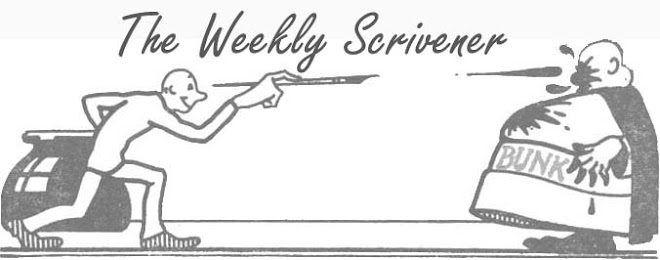Take an introduction to political science course and one of the first things you are taught is that there are Idealists and Pragmatists. Idealists, we are told, are important because they come up with the vision of a better future; however, they can’t get anything done because they lack “a sense of reality.” Pragmatists, on the other hand, might not be the most forward-thinking people, but they are the ones “who get things done.” Because “getting things done” is all that we can wish for in this society, Pragmatists are good, they are what we "need." So, when the choice is between the Idealist and the Pragmatist, the Pragmatist is the wise choice. To support an Idealist is a nice idea, but it is "folly."
Of course, there is a big problem with the above “logic.” One hitch is that political realities shift so fast that what is an ideal today is the most pragmatic approach tomorrow. Giving African Americans rights equal to Whites was derided as idealism up until the time that it was very apparent that Civil Rights marches would evolve into to riots and insurrection if the Civil Rights Movement’s demands were not met. Very quickly, what was an ideal became the most sensible and pragmatic solution.
I would argue that civil rights for African Americans was always a pragmatic solution to racial injustice, that it was idealism that assumed that a nation with two castes based on race would be able to thrive, let alone survive. Fast forward to now and it is very apparent that “idealists” who opposed Bush/Cheney’s march into Iraq were the real pragmatists. The real idealists were the NeoCons who preached that the only way the US could remain “safe” from terrorism was to invade Iraq and install a democracy. It was the real idealists who thought that a lean, mean military machine could “get things done” in a few months. It was the real idealists who voted to give Bush war powers, trusting that he and his pals knew what the hell they were doing. Back then, those idealists told us their vote was pragmatic.
Idealist. Pragmatist. When you look at history those words really don’t mean much. When you realize that people such as Thomas Jefferson, Tom Paine, Abe Lincoln, Frederick Douglas, Teddy Roosevelt, Elizabeth Cady Stanton, Franklin Roosevelt, Martin Luther King, Cesar Chavez, Rosa Parks, and many others were called idealists by their critics, it is apparent the the term is an epithet, not a description. Nelson Mandela was slammed as an idealist. So was Gandhi. Hell, on his first run for president, Ronald Reagan was painted as an idealist by the pragmatists in the Republican Party. Pragmatist? Idealist? In politics, the words are worthless.
How about we look at things instead as “long-term” and “short-term”? Did Democrats who supported the Bush march to war do so because it was good for the long-term health of the country, or the short-term health of their political careers? That is the question you need to ask.
As long as I can remember, moderates and conservatives within the Democratic Party have insisted that the most pragmatic thing to do was to support their wing of the party. Anyone who envisioned a politic that did not suck up to the country’s right wing was painted as an idealist. Democrats of all ilks capitulated , giving the right wing more and more power. That power has lead to a lawless Bush administration, senseless wars, a bankrupt economy, and environmental catastrophe. Democrats are now being told that the most pragmatic thing they can do with their vote is to vote for the pragmatist that helped bring about the current situation with their pragmatic approach to politics. To vote for the idealist, we are told, is to vote for words, not someone who “can get things done.” I think it is pretty clear that given the choice between idealism and pragmatism, you have nothing to lose by choosing the idealist (who seems to also be the real pragmatist).
The choice is between keeping people in power who have been pushing their style of pragmatism for the last 25 years, and moving forward and trying something that doesn’t have the same record of failure – both politically and in policy terms. It is a fight between insider politics and the rest of us. Think about that before you vote for the “safe” choice. Live a little.
February 4, 2008
Subscribe to:
Post Comments (Atom)

1 comment:
Amen, Bro'.
Even true at the local level. Where I live, an issue might be sidewalks and crossing lights for pedestrians. The DOT says, "studies show there is not enough pedestrian traffic to warrant ....etc." Well, if you have to risk your life to walk a mile to school or work, everyone is going to drive. Create the conditions for safe walking and maybe people will start to walk ... It's a damn step in the right direction! This is what we get when we let ourselves be ruled by so-called pragmatists
Post a Comment